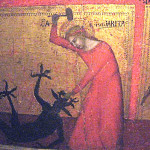We run our website the way we wished the whole internet worked: we provide high quality original content with no ads. We are funded solely by your direct support. Please consider supporting this project.
The Lessons of Job
Breno Peck via Compfight
In his book Benefit of the Doubt, Greg argues that the lessons of the book of Job reassure us that God does not lie behind suffering, but he rather is a trustworthy friend who can handle our doubt and pain. If you’re in the midst of grief or suffering, we hope these words will bring you both comfort and courage.
This inspired epic poem doesn’t explain why some people suffer and others do not, but it offers a singularly profound insight into why we ultimately can’t know the reason why. It’s not that God acts arbitrarily, as Job thought. Nor is it that people get what they deserve, as Job’s friends thought. Rather, good and evil and everything else unfold with apparent randomness because the causes that factor into what comes to pass flow out of a cosmos that is unfathomably vast and complex; a cosmos that includes a heavenly realm that sometimes influences events, as it did Job, but that we are not privy to, and a cosmos that is perpetually under siege by powerful hostile cosmic forces, represented by Leviathan and Behemoth.
More importantly, for our purposes, this inspired poetic drama also provides us with a poignant illustration of what it means to have an “Israelite” faith that honors God. It’s not a faith that is centered on right beliefs and pious language. And it’s certainly not a faith that focuses on feeling secure and worthwhile by convincing ourselves that we’re right. It’s rather a faith that is grounded in authenticity and that is therefore unwilling to sweep questions, doubts, and complaints under a pious rug to avoid the pain of cognitive dissonance. It’s a faith that is not afraid of going to the mat with God. (89-90)
Category: General
Tags: Benefit of the Doubt, Doubt, Pain, Problem of Evil, Suffering, The Book of Job, Theodicy
Related Reading

2 Ways We Misinterpret God’s Promises
In the church where I first found Christ, we used to sing a hymn called “Standing on the Promises of God.” The hymn itself isn’t bad, for it focuses entirely on our relationship with God. But in many cases, I’ve found this phrase applied in ways that express, and reinforce, a magical kind of faith.…

Warfare Worldview: A Basic Definition
The warfare worldview is based on the conviction that our world is engaged in a cosmic war between a myriad of agents, both human and angelic, that have aligned themselves with either God or Satan. We believe this worldview best reflects the response to evil depicted throughout the Bible. For example, Jesus unequivocally opposed evils…

Why Christ, not Scripture, is Our Ultimate Foundation
In a previous blog I argued that all our theological reflection must not only be Christ-centered, it must, most specifically, be cross-centered. I now want to begin to unpack some of the most important implications of adopting a cross-centered theological perspective. My ultimate goal is to show how a cross-centered theology is able to resolve the…

Satan and the Corruption of Nature: Seven Arguments
Man…trusted God was love indeed And love Creation’s final law – Tho’ Nature, red in tooth and claw With ravine, shrek’d against his creed” —Tennyson, In Memoriam Tennyson nailed it. We trust that God is love, but we also believe that God is the Creator of nature, and nature simply does not seem to point…

Why We Can’t Know Why Bad Things Happen
Science has demonstrated that the slightest variation in a sufficiently complex process at one point may cause remarkable variations in that process at another point. It’s called chaos theory. The flap of a butterfly wing in one part of the globe can be, under the right conditions, the deciding variable that brings about a hurricane…

Open2013 Reflections
Both participants and leaders share about what was happening at Open2013 and some of their thoughts on Open Theism. Listen in and hear from Greg Boyd, John Sanders, Tom Oord, T. C. Moore, Jessica Kelley and many more.

